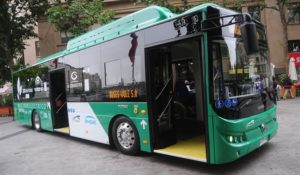Santiago is adopting Euro VI standards for all its new buses and progressively adding 90 new “zero-emission” buses to its public transport fleet, as part of an effort to reduce emissions from transport in the Chilean capital.
From 2019, 50 per cent of the 6,500-strong Transantiago bus fleet will meet EURO VI standard, including 90 buses that will be electric, hybrid or gas-powered.

In the Santiago metropolitan region, the transport sector is the main source of nitric oxide, nitrogen dioxide, nitrous oxide and carbon dioxide emissions, and the second largest source of emissions of PM2.5, ultrafine particulate matter (of 2.5 microgram or less, finer than the width of a human hair).
“The EURO VI requirement for buses and the 90 new zero-emission buses help reduce overall emissions from vehicles, a major source of air pollution in Santiago and many other cities around the world, while keeping the public moving and connected”
Chile’s Minister of Environment, Marcelo Mena
Santiago’s 30-year-long battle with air pollution has prompted the country to lead the way in the Latin American region in terms of policymaking for air quality: Chile was the first country in the region to adopt ultra-low sulfur diesel and petrol fuel standards, in 2009; the first to implement a mandatory vehicle fuel economy and emissions labelling system, in 2013; and, in 2014, was the first to adopt a tax on carbon dioxide and other air pollutants applying to light duty trucks and SUVs.
Severe pollution problems in Santiago have also led to more vehicle emissions standards being set more stringently and/or introduced earlier than those for the rest of the country, which themselves are now part of a larger, comprehensive plan to bring down the city’s vehicle, industrial and residential air pollutant emissions: Santiago Respira.
The city’s efforts, beginning in the early 1990s, have had dramatic effects, particularly on the main focus of Santiago Respira: PM2.5.
The 2012 annual average PM2.5 levels were 65 per cent lower than they were in 1989, having continuously fallen while the city was growing.
“We want a liveable city, and that includes healthy, breathable air. Making our vehicle fleet cleaner contributes to measures at city and national level to reap positive health and environmental outcomes,” said Minister Mena.
Find out more about Santiago’s switch to EURO VI standards and its new zero emission buses.